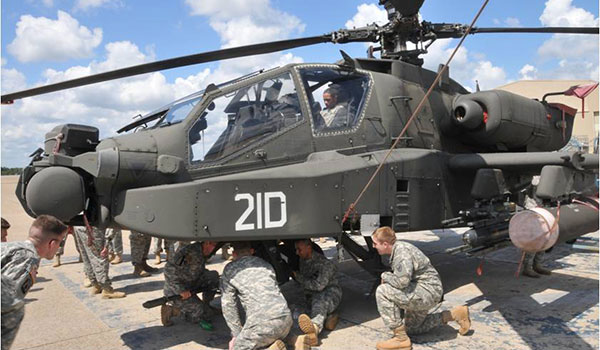
Chief Warrant Officer of the Branch / By CW5 Allen R. Godfrey: Warrant officers embody the desired character, competence, and commitment of the Army Profession. Mentorship both to them and by them will enhance their professionalism.

WO1 Daniel Ketchmark shares his knowledge of an Apache’s 30mm gun system with fellow students in the Aviation Basic Officer Leadership Course (Branch) (ABOLC-B) and Aviation Warrant Officer Basic Course (AWOBC)./ U.S. ARMY AVIATION CENTER OF EXCELLENCE COURTESY PHOTO
According to the Merriam-Webster Dictionary, a mentor is someone who teaches or gives help and advice to a less experienced and often younger person. In accordance with ADRP 6-22, Army Leadership, mentorship is the voluntary developmental relationship that exists between a person of greater experience and a person of lesser experience that is characterized by mutual trust and respect. Soldiers can increase their chances of mentorship by seeking performance feedback and by adopting an attitude of lifelong learning.
These self-development actions enable mentoring opportunities. Soldiers who seek feedback to focus their development, coupled with dedicated, well-informed mentors, will embed the concepts of lifelong learning, self-development, and adaptability into the Army’s culture.
Mentoring is an active process that takes place continuously throughout an Army career. This can be a formal or informal process. The mentor can outrank or be of the same rank. They can be older or the same age. However, the common occurrence is the mentor is someone with greater experience. This experience can be in specific and general areas.
The Beginning of the Process
Our junior warrant officers arrive in their first units with limited experience as to the expectations of them as warrant officers. The Warrant Officer Career College (WOCC) has the task of taking our noncommissioned officers and new Soldiers and developing them into warrant officers. This is done through a rigorous schedule of classes, exercises, and field problems.
The WOCC also has dedicated mentorship events, where senior warrant officers attending the Intermediate Level Education / Senior Service Education (WOILE/WOSSE) courses get a chance to talk to Warrant Officer Candidate School (WOCS) from the same Branch. In a few short weeks, the warrant officer candidate receives the basic experience to foster a change in behavior needed to become a warrant officer. However, this is the beginning of the process. Upon graduation, the new warrant officer moves on to their respective branch. There they receive the education and training further developing the thinking and skills necessary for entry-level duties and responsibilities. This does not mean they have the experiences, knowledge and skills as more senior warrant officers. Therefore, the first assignment is a key developmental period for our new warrant officers. Their experiences could affect the remainder of their career. The new warrant officer should reach out to the unit to establish a relationship. Warrant officers must be proactive in their own career development and are active members in their development. Additionally and more importantly, the unit should reach out to the new warrant officer. This begins with sponsorship. The sponsor in many regards has responsibility as a mentor.
The CAB CCWO
Among the duties of the Combat Aviation Brigade (CAB) Command Chief Warrant Officer (CCWO) is to teach, coach, and mentor the CAB warrant officers. In successful mentor programs, the CCWO develops a process where each incoming warrant officer receives an assigned mentor prior to arrival. The command assesses, selects, and trains these mentors. The new warrant officer immediately feels part of the team and quickly integrates into the unit mission.
The CAB structure facilitates mentoring opportunities. However, the structure of some units such as the Brigade Combat Team (BCT) shadow platoon does not easily facilitate mentoring. If fully manned, each platoon has two warrant officers. The recommendation for these warrant officers is establish a working relationship with the CAB. This is not only a source of mentorship for professional development, but also mentorship support for standardization, safety, and maintenance issues in the platoon.
Continued Mentorship
An example of continued mentorship is in the Aviation Warrant Officer Advanced Course (AWOAC) track specific training modules. A senior warrant officer in each track shares experiences with the AWOAC students. USAACE is also developing a class mentorship program.
One CW5 will be designated the class mentor. He or she will attend various class functions to include class dinners or mixers, Army Physical Fitness Test (APFT), and team building. The 151A Aviation Maintenance Technician WOAC already conducts mentorship dinners with a senior officer or warrant officer. Through senior warrant officer mentorship, these mid-grade leaders will refine their technical expertise and further develop their leadership and management skills.
Mentors and mentorship takes place at all levels and ranks. Every Soldier, warrant officer, and officer benefits from being a mentor and being mentored.
Remember to start our day asking, “What are we doing for the Warfighter?” At the end of the day, the answer is, “We provided no fail support to the Warfighter on the ground and in the air.”
“Above the Best”
CW5 Allen R. “Randy” Godfrey is the chief warrant officer of the Aviation Branch with the U.S. Army Aviation Center of Excellence, Fort Rucker, AL.










